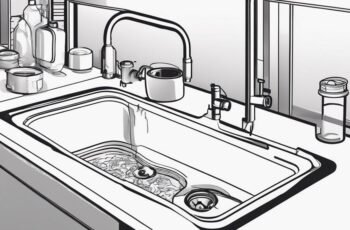In a septic tank cleaner treatment, the ingredients you'll find are enzymes, bacteria, surfactants, solvents, and other beneficial additives. Enzymes are essential for breaking down organic matter like fats and greases, ensuring proper tank maintenance. Bacteria play a significant role in decomposing solid waste and turning it into safer byproducts. Surfactants help by reducing water surface tension, aiding in the breakdown of organic materials. Solvents dissolve stubborn residues in the tank, making cleaning easier. These components work together to keep your septic system healthy and efficient.
Key Takeaways
- Enzymes break down organic matter, fats, oils, and greases in septic tank treatments.
- Bacteria aid in decomposing solid waste, maintaining tank health, and reducing odors.
- Surfactants reduce water surface tension, aiding in organic matter breakdown.
- Solvents dissolve stubborn organic substances like grease and oils for easier removal.
- Additives like enzymes, bacteria cultures, and oxygen-releasing compounds optimize septic tank maintenance.
Enzymes
Enzymes play a pivotal role in the effectiveness of septic tank cleaner treatments. These biological catalysts are necessary in breaking down organic matter, fats, oils, and greases that accumulate in septic systems. Enzyme effectiveness is dependent on various factors, including pH levels, temperature, and substrate concentration.
Proper enzyme application techniques are essential for optimal performance. To guarantee maximum enzyme effectiveness, it is important to follow manufacturer instructions regarding dosage and frequency of application. Enzymes work best under specific conditions, so understanding the environment of your septic tank is key.
When applying enzymes, make sure to distribute them evenly throughout the tank to ensure thorough coverage and contact with waste materials. Additionally, consider using enzyme-based products that contain a variety of enzyme strains to target different types of organic matter effectively.
Bacteria
Bacteria, important components in septic tank cleaner treatments, play a significant role in the decomposition of organic waste matter within the system. These beneficial bacteria are vital for breaking down solid waste and maintaining the overall health and functionality of your septic tank. By introducing specific strains of bacteria into the tank, you can enhance its effectiveness in breaking down waste and preventing clogs or backups.
The benefits of these bacteria are manifold. They aid in the breakdown of proteins, starches, oils, and grease, ensuring that these substances are efficiently processed within the tank. This breakdown process not only helps to prevent blockages but also reduces unpleasant odors and promotes a healthier environment within the tank. Additionally, the presence of these bacteria can improve the overall effectiveness of the septic system, leading to smoother operation and fewer maintenance issues.
Surfactants
Utilized in septic tank cleaner treatments, surfactants are compounds that play an essential role in enhancing the efficiency of the cleaning process. Surfactants are highly effective in septic tank cleaner treatments due to their ability to reduce the surface tension of water, allowing it to penetrate and break down grease, oil, and other organic matter more effectively. By lowering the surface tension, surfactants help the cleaning solution spread evenly across the tank, ensuring a thorough cleaning. It's vital to opt for products like SEPTIFIX that contain biodegradable and environmentally friendly surfactants to minimize any negative impact on the environment.
Solvents
Enhancing the effectiveness of septic tank cleaner treatments, solvents are key components that aid in dissolving and breaking down stubborn organic substances within the tank. Solvents play a pivotal role in breaking the bonds between grease, oils, and other challenging-to-remove residues, allowing them to be more easily flushed out of the septic system.
When selecting solvents for septic tank cleaners, it is crucial to contemplate eco-friendly alternatives to minimize harmful effects on the environment. Harsh chemical solvents can potentially disrupt the balance of beneficial bacteria in the septic tank, leading to system malfunctions and contamination of groundwater.
Opting for eco-friendly solvents not only ensures the safety of your septic system but also contributes to a healthier environment. Look for solvents derived from natural sources or those labeled as biodegradable to lessen the impact on the ecosystem. By choosing environmentally conscious solvents, you can effectively clean your septic tank without compromising on sustainability.
Other Additives
To further optimize the performance of septic tank cleaner treatments, the incorporation of specific additives can greatly aid in the breakdown and removal of various organic waste materials. When seeking eco-friendly options for septic tank maintenance, DIY solutions often involve the utilization of additives such as enzymes, bacteria cultures, and oxygen-releasing compounds.
Enzymes are commonly used additives in septic tank cleaners due to their ability to break down organic matter effectively. These biological catalysts accelerate the decomposition process, ensuring that solid waste is converted into simpler forms that are easier for the system to handle.
Bacteria cultures, especially those containing beneficial strains like lactobacillus, can also be added to septic tank treatments. These cultures work to digest organic waste, reducing the accumulation of sludge and preventing clogs within the system.
Oxygen-releasing compounds, such as hydrogen peroxide, can help aerate the septic tank environment, promoting the growth of aerobic bacteria that thrive in oxygen-rich conditions. This can enhance the overall efficiency of the breakdown process and contribute to a healthier septic system. When exploring septic tank cleaner treatments, consider incorporating these eco-friendly additives for a more sustainable approach to maintenance.

